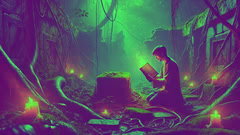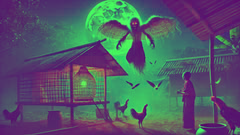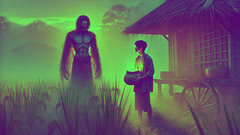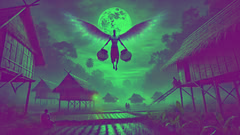Introduction
When dusk drapes itself over the Thai countryside, and the cicadas fall silent beneath a sky thick with indigo and anticipation, the villagers of Ban Sai Noi retreat indoors. Shadows stretch long between the tamarind trees and the bamboo huts, as if memories themselves are fleeing from what comes with nightfall. For centuries, stories have flickered like lantern light in the hush of these evenings—stories that warn against venturing out after dark, stories of spirits hungry for mischief or vengeance. Among them, none chills the bones or ignites the imagination quite like the legend of the Krahang.
In ancient Thailand, before concrete roads and electric bulbs tamed the wilds, the borderlands between the seen and unseen were thinner. The dense forests pressed close, vines tangled with secrets, and every rustle could be a spirit stirring. Within these realms, the Krahang reigned as a figure of dread—a sorcerer twisted by forbidden arts, condemned to wander the night as a shirtless man, his arms outstretched, soaring eerily above the rice fields with rice baskets strapped to his sides as unnatural wings. Some said his eyes glowed like embers, others claimed his laughter sounded like a sickle scraping stone. His presence was a whisper on the wind, a chill at the nape, a fleeting shadow flitting from palm to palm.
But where did he come from? Why did he haunt the villagers, stealing their peace and sometimes much more? The tale, as it’s whispered from grandmother to child, is one of envy, ambition, and the cost of meddling with powers beyond mortal ken. It is a story rooted in the earthiness of rural life—the rustle of rice stalks, the scent of lemongrass and charcoal, the steady rhythm of a water buffalo’s plod—and shadowed by the mysteries that only the bravest dare to confront. The legend of Krahang endures not just as a warning, but as a testament to the resilience of communities bound by fear, faith, and the determination to see dawn’s first light again.
The Sorcerer’s Downfall
Once, before he was known as the Krahang, he was simply Khun Prasert—a man of middling means and restless ambition. Prasert lived at the edge of Ban Sai Noi, where the land met the wild tangle of forest, and the village’s faith in its own smallness warred against dreams of something greater. He was clever, skilled with herbs and charms, and people sought him for healing or to bless their fields. Yet, beneath his service, resentment simmered. Prasert envied the chieftain, envied those whose fields gleamed greenest and whose granaries overflowed after harvest. The villagers’ gratitude was never enough; he yearned for more than a healer’s quiet respect.

One monsoon season, after floods ravaged the crops and hunger gnawed at every home, Prasert’s patience finally snapped. He heard rumors of a forbidden grimoire hidden deep in the forest—a book said to grant command over spirits, to bend fortune’s tide for those willing to pay its price. The elders had warned for generations: the forest was no place for greed, and some knowledge was better left tangled in roots and shadows. But Prasert’s hunger for power was louder than any warning.
He ventured out under the cover of a cloudy night, torch in hand, determined to return with the means to elevate himself above his neighbors. The forest swallowed him whole. Branches scraped his skin, and the buzz of insects gave way to whispers in a tongue he half-understood. For three days and nights, he wandered, until at last he found a shrine overgrown by moss. Inside, cradled in dust, lay the book. Its pages pulsed with an uncanny warmth. When Prasert opened it, the air thickened, the world outside silenced.
He read the incantations aloud, voice quivering, barely understanding the words that slithered from his lips. Spirits stirred. The ground trembled. Prasert saw visions—of himself, powerful and revered, villagers bowing low, his enemies falling before him. But as he finished the final chant, something changed. His body convulsed; his arms burned as invisible shackles closed around his chest. He stumbled from the shrine, but the forest would not release him. When at last he crawled back into the village, eyes wild, shirt torn, something vital inside him was broken.
The days that followed were a fever of hunger and pain. He couldn’t eat rice or fruit; only raw, rotting things sated him. His skin grew gray and cold. At night, he felt an urge to run, to leap into the darkness. One night, driven by agony and panic, Prasert lashed two rice baskets to his arms—remnants from his mother’s home—and fled into the fields. Under the waxing moon, he leapt higher and higher until, impossibly, he soared. The baskets became extensions of himself, bearing him aloft on unnatural winds. He was no longer Khun Prasert. He was Krahang—the cursed.
With each passing night, his humanity faded. The villagers soon learned to dread the sound of baskets brushing rooftops, the cold gusts that signaled his arrival. Chickens vanished, rice stores spoiled overnight, and those who dared to chase the apparition sometimes disappeared themselves. The elders realized too late: Prasert’s ambition had unleashed a scourge they could not contain.
Moonlit Terror in Ban Sai Noi
The transformation of Prasert into Krahang marked a dark turn for Ban Sai Noi. As word of his curse spread from mouth to mouth, fear wormed its way into every hut and heart. The village—once alive with laughter and children’s games—grew silent after sunset. Doors were barred with bamboo poles, and talismans of coconut shells and salt hung in every window. Mothers hushed their children with stories of Krahang’s hunger for careless souls who wandered after dark.

But terror is never content to remain in whispers alone. One night, the widow Saipin awoke to frantic squawking. Through the slits of her window, she glimpsed a figure gliding above her chicken coop—bare-chested, wild-haired, and haloed by moonlight. The rice baskets at his sides flapped with a sound like distant thunder. The chickens vanished; only a smear of feathers remained. The villagers gathered at dawn to find Saipin weeping over empty nests and clawed earth. Rumors grew: some said Krahang could slip through cracks in the walls, others believed he could command animals and storms.
As the attacks increased, suspicion began to divide the village. Who had let Prasert go astray? Was it the fault of the elders, or had someone helped him seek the forbidden shrine? Distrust festered, old grievances resurfaced, and the sense of community that had always bound Ban Sai Noi was strained to breaking. Yet even as fear gnawed at their unity, a few among them resolved to fight back.
Among these was Lek, a young farmer whose mother had once been healed by Prasert. Lek remembered the kindness beneath the ambition, the way Prasert had comforted his mother during her illness. Determined to end the curse, Lek visited the village’s oldest spirit medium—a woman known as Mae Jum.
Mae Jum lived on the farthest edge of Ban Sai Noi, her house tangled in vines and fragrant with incense. She listened to Lek’s plea, her eyes cloudy with wisdom. “Krahang is not only a spirit,” she whispered. “He is a man who forgot humility and family. You cannot kill what is already cursed, but you may help him remember.”
Mae Jum gave Lek a satchel of sacred herbs and a charm woven from his mother’s hair. “Place this where he once knew love,” she instructed. “Call him by his true name when the moon is highest. Remind him he was once like us.” Armed with hope and fear, Lek waited for the next full moon.
Confronting the Shadows
As night fell on the appointed evening, the village held its collective breath. Lek crept through the narrow paths between rice paddies, heart pounding with every step. The moon hung huge and low, painting the world in silvery sorrow. He reached Prasert’s abandoned hut—now overgrown with weeds and half-collapsed. Here, Lek laid the satchel and charm upon the threshold, whispering prayers as Mae Jum had taught him.

Around him, the world seemed to pause. Even the frogs and crickets stilled their chorus. Lek lit a small candle, its flame flickering in the humid air. Then he waited, calling softly: “Prasert… Prasert… Come home.”
At first there was nothing but silence. Then, a rustling in the tall grass. A shadow separated itself from the darkness—a gaunt figure, eyes burning red, baskets creaking at his sides. Krahang landed heavily before Lek, his face twisting between rage and confusion. The wind picked up, carrying the scent of damp earth and old sorrow.
“Why do you call me by that name?” the spirit hissed. “I am no longer Prasert.”
Lek stood firm, though his legs trembled. “You were once part of us. You healed my mother. You loved your village. This curse is not stronger than your heart.”
Krahang recoiled, torn between memory and the hunger that now ruled him. For a moment, Lek glimpsed the man he had known—the gentle healer, the neighbor who had once mended broken fences and tended sick children. The spirit let out a howl that echoed over the fields, a sound of anguish and longing.
The sacred charm glowed softly. Krahang staggered back as if struck by a blow. He clutched his chest; tears mingled with sweat on his brow. The baskets at his sides shuddered, their edges fraying as if unraveling under invisible hands.
“Help me,” Krahang whispered at last, voice barely human. “I… I remember.”
Lek knelt before him, offering the charm. “You must release what you cannot carry alone. Let go.”
As dawn’s first rays touched the village, the curse began to lift. Krahang’s basket wings crumbled into dust. His form flickered, shifting between shadow and flesh. The villagers, drawn by the commotion, watched in stunned silence as Prasert knelt in the dirt—no longer a spirit, but a man broken and sobbing, his curse at last undone by memory and forgiveness.
Conclusion
The legend of Krahang echoes through generations as more than just a tale of terror—it is a lesson etched into the soul of Ban Sai Noi and villages like it across Thailand. The villagers never forgot the hunger that ambition could sow, or how easily fear could unravel the bonds between neighbors. Yet they also remembered how courage and compassion—embodied by Lek’s unwavering heart—could mend what was broken, even after years of darkness.
Long after Prasert’s curse faded and he returned to a quiet life of humility and service, the fields grew lush again, laughter returned to the lanes, and the night no longer brought only dread. Children dared to chase fireflies beneath the full moon, always watched by loving eyes and protected by stories that reminded them where shadows end and hope begins. In time, the Krahang became a symbol—not just of warning, but of the triumph of humanity over its own frailties. For in the heart of every legend lies a simple truth: it is not the spirits or curses that define a village, but the bravery and forgiveness of those who call it home.













